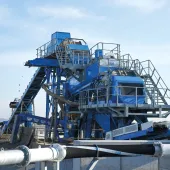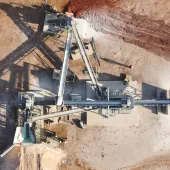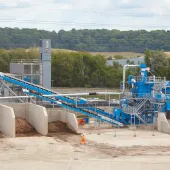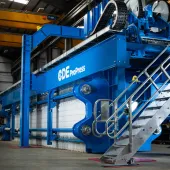Aggregate Wash Plant Upgrade for Creagh Concrete

First published in the August 2013 issue of Quarry Management as Reserves Released
Wash plant upgrade releases 4 million tonnes of material for Creagh Concrete
An upgrade of the existing washing plant at Creagh Concrete’s Draperstown Quarry has released 4 million tonnes of material and extended the life of the site by 10 years.
Creagh Concrete are the largest land-based sand and gravel producers in Northern Ireland, and the sands and aggregates they produce at various locations are used in the production of a range of precast products as well as ready-mixed concrete.
‘We currently produce 500,000 tonnes of material per year with 75% used internally and the remaining 25% being sold to the local market,’ explained Willie Doherty, divisional director at Creagh Concrete.
The upgrade to the existing CDE washing plant was required as a result of a band of extremely difficult material being exposed near the floor of the pit. This material could not be processed effectively through the existing crushing, screening and washing plant due to high levels of plastic clay.
‘Using our existing processing system we were not able to extract any value from the raw material,’ said Colm Scullion, quarry manager at Creagh Concrete. ‘The absence of a suitable attrition system within the existing plant needed to be addressed and it was at this point that we engaged with CDE to provide a tailored solution.’
The reserve is characterized by heavily clay-bound material with approximately 30% waste and initial discussions with CDE were focused on establishing whether it made commercial sense to invest in a new processing system.
‘The material we were faced with is among the worst that I’ve seen and at the outset all options were on the table, including ceasing production at Draperstown and looking for reserves at a new site,’ said Willie Doherty.
‘The ideal solution was to be able to continue working at the existing site as all the required planning consents were in place, which has obvious time and cost benefits.’
Detailed discussions with CDE’s project design team followed and the outcome was agreement on a two-stage upgrade to the existing plant. The first stage involved an upgrade of the original water-treatment and recycling system. This saw the replacement of an existing AquaCycle A400 thickener with an AquaCycle A1500.
‘Before we could consider beginning to process this difficult material the water-treatment system needed a substantial upgrade in order to be able to cope with the higher level of waste silts and clays that we would now be dealing with,’ explained Colm Scullion.
The AquaCycle A1500 at Draperstown Quarry represents the first global installation for the new thickener, which was designed specifically for this application and highlights the partnership relationship that has existed between CDE and Creagh Concrete since the early 1990s.
‘The Creagh Concrete and CDE relationship works because we both understand the need to keep innovating and coming up with new and improved processing systems to allow us to extract maximum value from our reserves,’ said Gerard McKeague, joint managing director of Creagh Concrete. ‘This focus on efficient and sustainable management of our natural resources is central to our business.’
Unlike many other instances where the AquaCycle thickener has been specified the driver was not an issue with water supply, but rather an example of how environmental considerations are at the centre of the decision-making process for Creagh Concrete. ‘We’re not short of water or space for settling ponds at Draperstown Quarry,’ said Mr McKeague. ‘The focus on water treatment as an essential part of the washing plant is driven by our mission to minimize the environmental impact of all our operations.’
Once the water-treatment upgrade had been completed, stage two of the plant upgrade was initiated. This involved the introduction of an AggMax portable logwasher and an EvoWash sand-washing plant. The AggMax incorporates a grizzly screen, RotoMax RX150S log-washer and EvoScreen dewatering screen on a single chassis.
The new plant accepts –75mm as-dug material which has been pre-screened at the face. The +75mm material is subsequently processed through an existing jaw crusher.
‘One of the keys to success for the new plant was delivering the material to our plant freshly dug,’ explained Paul O’Neill, CDE project manager on this installation. ‘Our experience with heavily clay-bound material suggests that if it is stockpiled and exposed to rain, it becomes almost impossible to handle.’
The –75mm material is delivered to a feed hopper and transferred to the AggMax where the grizzly screen removes any remaining oversize material. After entering the RotoMax the feed material is then subjected to extreme attrition which breaks down the clay.
The –75mm +5mm material is then dewatered while the –5mm material is sent to the EvoWash sand washing plant. The –75mm +5mm material is then conveyed to the existing dry screening plant and classified into the various aggregate grades required by Creagh Concrete within their own precast and ready-mixed concrete manufacturing operations.
‘We had seen the RotoMax in action at other CDE installations but given the material we were faced with, I’ll admit that we had reservations as to whether it would be enough in this case,’ commented Willie Doherty.
‘Anyone that we spoke to at CDE was sure that it was up to the job and the results being achieved by the new plant are testament to the capability of the machine.’
The new plant operates at between 100 tonnes/h and 150 tonnes/h as a result of the variation in the feed material, as Paul O’Neill explained: ‘Where the feed contains a larger proportion of –5mm material the feed capacity is reduced, while a larger proportion of –75mm +5mm aggregate material allows for an increased feed rate. Based on extensive material testing the reserve is made up of approximately 30% silts and clay and an equal split of sand and aggregate material.’
Following successful completion of the two-stage plant upgrade, Creagh Concrete will be able to continue to produce a wide range of sand and aggregate products from Draperstown Quarry for the foreseeable future.
‘From an initial point where we thought our days at Draperstown were limited, we are now in a position where we have comfort that the reserve is fully exploitable,’ said Gerard McKeague.
Before the new plant was installed Creagh Concrete were faced with a reserve that had cost £1.00 per tonne of material processed, based on the purchase price for the quarry in
1991. The introduction of the new plant has reduced this to £0.25 per tonne. ‘This makes the wash plant upgrade one of the best investments we have ever made,’ concluded Mr McKeague.
- Subscribe to Quarry Management, the monthly journal for the mineral products industry, to read articles before they appear on Agg-Net








